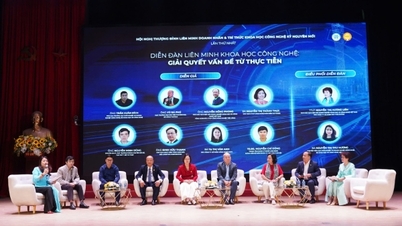
Image depicting AI smartphone user
AI assistant on smartphone
New phone lines—from Samsung's Galaxy AI to the Gemini-powered Google Pixel, or the upcoming Apple Intelligence on the iPhone—are putting AI at the center of the user experience.
Now, instead of searching and opening each application, users just need to say or type: "Summarize this document", "Find photos taken with Lan in Da Lat", "Write a witty birthday greeting"... and the smartphone will understand and execute immediately.
These are no longer basic virtual assistants like Siri or Google Assistant before, but Smartphone AI - a new layer of intelligence capable of natural language processing, understanding context, personalization and decision making. This makes the experience of using the phone significantly more flexible and natural.
Along with that, a trend is emerging: "zero UI" - hidden interface . The user interface is no longer a series of application icons, but a dialogue between humans and machines. Users do not need to know "which app to use", they just need to know what they need.
However, smartphone AI has not completely replaced apps. It still needs to rely on apps to perform some functions: sending emails, saving calendars, searching for photos...
The difference is that users no longer directly interact with the application, but interact through AI - an intelligent intermediary layer.
From convenience to concern
The rise of AI smartphones has come with its own controversies. First is privacy.
As AI gets smarter, it needs more data—and that data comes from users. Images, browsing history, location, calls, even speech patterns—can all be used to train machine AI models.
Although companies are promoting the "on-device AI" model (AI processed internally, not sending data to the cloud), it is still difficult for users to fully control.
Next is the issue of control and accuracy . Once too dependent on AI , users can gradually lose the skills to operate, search, or understand the system - just like we gradually forget how to look up a map when we have Google Maps. In addition, AI can still misunderstand commands, return incorrect results, or be abused if it falls into the wrong hands.
For app developers, they are facing the challenge of adapting. Beautiful interfaces and rich features are no longer the only factors.
Instead, applications need to be able to interact well with AI – through open APIs, structured data, and the ability to integrate into each vendor's AI ecosystem.
Ultimately, the scenario is this: if users only interact with a single AI - for example, Gemini, Siri or Galaxy AI - will the future of the mobile app ecosystem still be diverse? Or will we enter a period where "AI chooses apps for us", and developers are forced to "please AI" instead of users?
Smartphone AI is not just a technology trend, it is a step forward in the way humans interact with machines .
As apps become invisible and every action becomes a conversation, we are witnessing the biggest shift since the advent of smartphones: from touching to understanding.
And maybe in the near future, we will no longer “use” phones, but will talk to AI.
Source: https://tuoitre.vn/smartphone-ai-tro-ly-thong-minh-dang-thay-the-ung-dung-2025060410333081.htm



![[Photo] 60th Anniversary of the Founding of the Vietnam Association of Photographic Artists](/_next/image?url=https%3A%2F%2Fvphoto.vietnam.vn%2Fthumb%2F1200x675%2Fvietnam%2Fresource%2FIMAGE%2F2025%2F12%2F05%2F1764935864512_a1-bnd-0841-9740-jpg.webp&w=3840&q=75)


![[Photo] National Assembly Chairman Tran Thanh Man attends the VinFuture 2025 Award Ceremony](/_next/image?url=https%3A%2F%2Fvphoto.vietnam.vn%2Fthumb%2F1200x675%2Fvietnam%2Fresource%2FIMAGE%2F2025%2F12%2F05%2F1764951162416_2628509768338816493-6995-jpg.webp&w=3840&q=75)






























































































Comment (0)